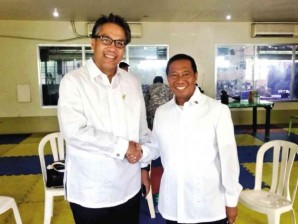I see that my good friend, the eminent scholar Jojo Abinales, has written a deliberately provocative think piece. I think he would be delighted to learn that I disagree with him. He enjoys a good argument, and I will give it to him.
In “It’s the barangays, stupid,” Abinales borrows an expression made famous by US President Bill Clinton’s 1992 campaign team to highlight an important fact about the 2016 elections in the Philippines: “A glimpse at the balance of power across the nation shows that [Vice President Jejomar] Binay has a clear advantage over [Interior Secretary Mar] Roxas.” He means the balance of local power, in “the provinces and peripheries of the nation.” The Carvillean “stupid” part refers, I assume, to the obvious clearness of this advantage.
He lists the local clans and political blocs likely to support Binay; it is not an exhaustive list (the form dictates that it cannot be). But four to five paragraphs of prominent names do not an accurate political map make; it may or may not be true that “Davao City’s Rodrigo Duterte has not made his choice yet, although rumors are if Binay promises to respect his autonomy, the charismatic and popular mayor will surely vote UNA.” But even if Duterte did, how many of Davao’s 900,000-plus voters will vote with him? Abinales doesn’t show.
(He also doesn’t mention that, in fact, Duterte in yet another run for the mayor’s post last year won with only about 450,000 votes—I say “only,” because someone skimming his commentary may think that Duterte speaks for all of Davao City’s 900,000-plus voters. This is a substantial difference, which political strategists will necessarily factor in into their plans. It is even possible, as Among Ed Panlilio’s victory in Pampanga in 2007 should tell us, that rival political families can cancel each other out.)
Indeed, this is the problem with Abinales’ analysis: He does not back up his reading of the situation with numbers. He does not seek to prove that the political families he mentions have a track record in turning out the vote, or even that their own candidates have lengthy political coattails. Apparently, for Abinales, it is enough that, just to cite one example, the alliance of the Remullas and the Revillas in fast-growing Cavite continues to this day, for Cavite’s votes to be considered locked in for Binay.
On the other hand, he gives the pro-Aquino and presumably pro-Roxas reading a stricter interpretation. “If the MILF leadership will show its gratitude to Aquino for the Bangsamoro Basic Law (if passed) by ordering its followers to vote for Roxas, it is not clear whether the latter will abide by the order. For even this revolutionary and Islamic organization can be undermined by the family loyalties of their soldiers.”
But is it in fact clear that the supporters and allies and constituents of the political families he mentions will also “abide by the order” to vote for Binay? He doesn’t show. Just one problematic example: He includes the “Jalosjos clan’s Alliance of Parties for Progress” in his list. But in 2013, seven of 10 Jalosjos clan members running for office lost their respective bids. This simple fact, available to all (since it was written up at the time), would at the very least place the clan’s clout in doubt; but it seems that Abinales reserves his skepticism only for those who support Roxas.
Abinales is an excellent scholar, one of the very best, and as I have written in this space before, a man of deep learning and insightful nuance. His latest analysis, however, seems to have been driven mainly by the urge to goad “pro-Aquino and pro-reform trolls” (his introductory words) into paroxysms of despair. (And, eventually, into “protracted street-by-street” action.)
But his analysis is based on the unexamined notion of a command vote, of local fiefdoms pledging their fealty to an overlord. That was exactly the Far Eastern Economic Review’s reading in 1992, when it called the election not for Fidel Ramos but for Ramon Mitra. But if one tracked the surveys, the Ramos victory and the Mitra debacle couldn’t have come as a surprise. (The defeat of Jose de Venecia in 1998 is instructive too.)
It is true that some of those who support Roxas (and for the umpteenth time let me say I did not vote for him in 2010) seem to read too much into the latest surveys. Binay has certainly taken a beating, and while there has been an appreciable increase in Roxas’ ratings, it is too soon to make too much of it.
I think Abinales (like me, born and raised in Mindanao) misreads the controversy over Binay’s alleged corruption as Manila-centric. Here is the core of his argument: “Senate hearings and national media headlines however are not good gauges of which candidates people will vote for. Students of Philippine politics have repeatedly reminded us that the country’s major political battles are not [sic] waged and won not in the imperial capital but the provinces and the peripheries of the nation.”
Major political battles—that is perhaps an overbroad term, when the subject is merely a national election. But if one substitutes “national elections” for “major political battles” in the second sentence of his core argument, then the argument no longer makes sense. “National elections are waged and won not in the imperial capital but the provinces and the peripheries of the nation.” But of course; that’s where the majority of the voters reside. His principal thesis, then, is actually the first sentence. “Senate hearings and national media headlines … are not good gauges.”
He has a point, of course. But it is reductionist to claim, as he does, that his point about the balance of local power will dictate the outcome in 2016. Or even that the battle will be between Binay and Roxas.


